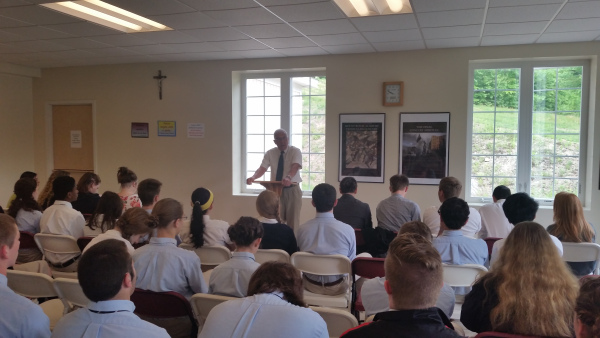
Seniors completed their final year of high school with a fourth year English course that culminated in a ten-page essay on a topic they presented to the entire high school in brief speeches addressing the main themes and conclusions of their arguments.
They spent the year studying classical works like Homer’s Odyssey, Sophocles’ Oedipus the King and Antigone, Virgil’s Aeneid, Milton’s Paradise Lost, and Dante’s Purgatory. They then contrasted them with modern works like Montaigne’s Essays, Herman Melville’s Billy Budd, Sailor, and C.S. Lewis’ That Hideous Strength.
Several students wrote essays based on a statement from Lewis’s novel. Lewis describes his main character, Mark Studdock, an aspiring sociologist, as a purely modern thinker with no sense of tradition, the wisdom of the past, or the ideals of Christian civilization:
“It must be remembered that in Mark’s mind hardly one rag of noble thought, either Christian or Pagan, had a secure lodging. His education had been neither scientific nor classical—merely ‘Modern.’ The severities of abstraction and of high human tradition had passed him by: he had neither peasant shrewdness nor aristocratic honour to help him.”
Students explained these noble thoughts of antiquity that inspired Greek, Roman, and Christian writers-- ideas like piety to the gods, devotion to family, respect for the Natural Law and sacred moral teachings, the virtue of magnanimity, the love of truth, and the Beatific Vision—were absent in the protagonists of many modern works. They contrasted Montaigne’s modern idea of relative truth to the objectivity and universality of truth found in Homer, Virgil, and Milton. They recognized the world of difference between the classical idea of justice (what every person owes to other human beings as their proper due) to the modern idea of justice as contractual or legal, something decided by governments and courts rather than determined by the moral teachings of divine authority.
They noticed that the Greek idea of the art of living well—the balance of work and play and the life of temperance and moderation—are absent in the modern world of “workaholism” and addictions that has no grasp of the idea that man works in order to live and play rather than lives in order to work. Students discovered that modern progressives like the strange scientists and intellectuals in Lewis’s novel reject the created order of Mother Nature and God’s Providence and presume to be gods themselves who will invent “a new man” who never dies, who lives with only a head detached from the body, and who makes “objective” decisions without any feelings.

Comparing the classical view of man, Nature, and the divine, the seniors discovered the great wisdom of the past, its venerable tradition, and its sane philosophy of life that respects “the nature of things” as intended by Nature and God rather than attempts to remake the world according to a utopian vision divorced from all of reality and from the entire accumulated experience of the human race.
In their senior seminar and study of the great books, seniors escaped the bias known as “chronological snobbery,” a term used by C.S. Lewis to identify the belief that all valid knowledge belongs to the present age and that all the truth and wisdom of the past is outdated and useless.

